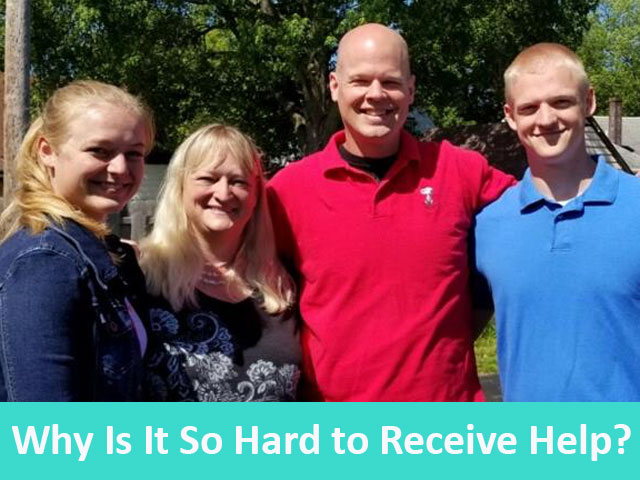by Glenn Moots
Homeowner, Midland, Michigan
It is hard to accept help from others.
As Christians, we hear the direction of Paul telling us to be “cheerful givers.” (2 Corinthians 9:7). Paul also tells us (quoting Jesus) “It is more blessed to give than to receive” (Acts 20:35). We are tempted to infer from this that God loves givers more than receivers.
The Western tradition also commends giving more than receiving. Aristotle’s Nicomachean Ethics, a landmark text, and part of the education of the Protestant Reformers, praises generosity great and small. Aristotle emphasizes that while benefactors do something noble, the same cannot be said for their beneficiaries. In his De Officiis (often translated On Duties) Cicero offers extensive advice on giving. Like Aristotle, he also emphasizes reciprocity: It is shameful to receive without giving something in turn, ideally of similar value. Hence, while giving is honorable, receiving is not—and it puts us in debt to others.
As if all this doesn’t make receiving help hard enough, Americans are expected to be self-sufficient. Our culture prizes self-sufficiency and independence. We celebrate the entrepreneur and the innovator who solve problems, not those who fall prey to problems. Receiving help is associated with dependence, laziness, or weakness.
Finally, it just feels good to do things for others—much better than it does to receive help. Social scientists studying “positive psychology,” the psychology of happiness, have correlated giving and happiness in multiple studies. Not only are givers happier, but happier people are also more likely to give.
If we did not believe in a sovereign God, and the importance of the Church, all of this would be enough to discourage any of us from accepting help. But let’s think through it a little more.
It is our sovereign God who directs our affairs. He not only puts us in circumstances where we should give, but in circumstances where we must receive. Even if it is more blessed to give, someone must be given to. There cannot be givers without receivers, and each are called to their position in God’s good time. Ephesians 2:10 tells us that as God’s handiwork we are created in Christ Jesus to do good works. Even if receiving isn’t a “good work” in the sense we typically think of it, deliverance is also good in its own way. Through the providential deliverance of God, we are able to understand His lovingkindness better (Psalm 107:43). We should not think that God loves us any less because we are receivers. In fact, it is when we are in need that we see the love of God most tangibly.
We see His love best in the Church. Bearing one another’s burdens, Paul says, fulfills the law of Christ (Galatians 6:2).Paul also says, in speaking of the Church as the Body of Christ that “If one part suffers, all the parts suffer with it” (I Corinthians 12:26). We are parts of one another, and we are knit together to build one another up. This building cannot just be spiritual but must also care for our physical needs. Consider your own experience, too: Are the bonds in your church strengthened more when everyone is self-sufficient, or when you come to one another’s rescue? When it’s your turn to receive help, don’t be prideful; be used of God to strengthen the relationships at your church.
Doesn’t receiving help imply weakness or a failure to plan or prepare? Despite even our best and most prudent provision, only the LORD determines our future. We may admire those who seem to have control over their own lives, but Scripture tells us repeatedly that our times are in His hands. Consider, for example, the best preparation for warfare in the ancient world, the horse. In three places, God calls it a vain hope if He does not decree victory (Proverbs 21:31, Psalm 33:17, Isaiah 31:1). Even the best preparation is an occasion for godly humility. The LORD must bless us if our preparation is to succeed.
As for happiness, receiving help enables gratitude, which is also closely correlated with happiness in multiple psychological studies. God calls us to be thankful in all circumstances of life (I Thessalonians 5:18), and that includes circumstances we may not want—like when we need help from others. Receiving help is an occasion to practice thankfulness, and to be blessed by the virtue of gratitude God commands.
Like all counsel that we give to one another, we confess that our family hasn’t always taken this counsel to heart. It was hard to receive help through two rounds of cancer, and then the dam failure that deluged our home with six feet of water. Last May, we were overwhelmed by the love of God. In the early days, that help came in the hands and hearts of friends and strangers. In the months that followed, our help came from the remarkable work of men and women organized and solicited by OPC Disaster Response. No amount of pride or preparation could have blessed us more than humbly receiving that help. We still felt a debt to others—a debt we can never repay. But ultimately, we have to see our need as being part of the plan of a loving Father—not only for us but also for those who came alongside us.
And we have to see all this as a means to build the Church, to give God glory, and to remind us of the promises of scripture. When you need help, ask God to help you do the same.
Want to learn more about New Hope Church? Click here.

